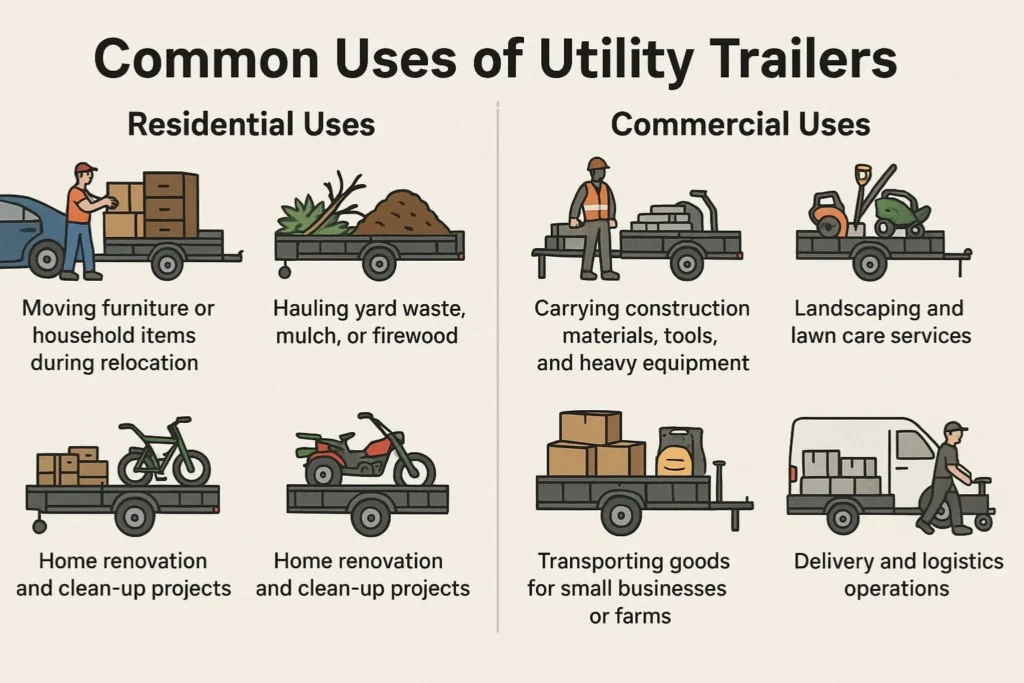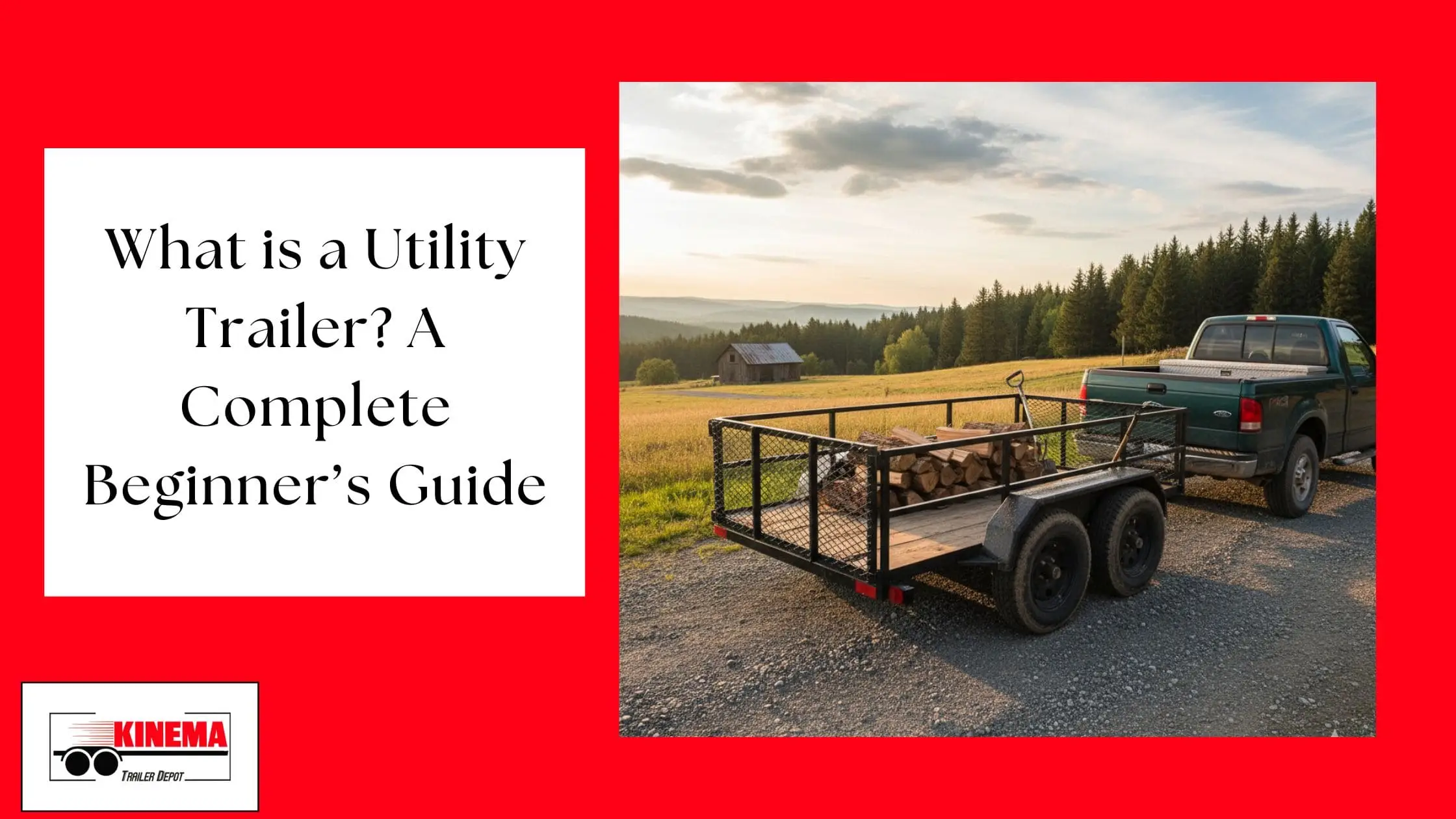If you have ever tried to move heavy items, haul equipment, or transport materials, you have probably realized how helpful a utility trailer can be. Whether you are a homeowner working on weekend projects or a small business owner managing deliveries, a utility trailer can make your life much easier.
In this complete beginner’s guide, we will explain everything you need to know about utility trailers from what they are and how they are used to costs, maintenance, and registration. By the end, you will know exactly what type of trailer fits your needs and how to get the best value out of it.
What is a Utility Trailer?
A utility trailer is a non-motorized vehicle that you attach to your car, truck, or SUV to transport goods, equipment, or materials. It is designed to carry heavy loads that your vehicle alone cannot handle.
The key feature of a utility trailer is its versatility. You can use it for moving furniture, hauling landscaping equipment, transporting ATVs, or even carrying construction materials. Most utility trailers have flat beds with side rails, while others may have enclosed bodies for added protection.
Unlike specialized trailers such as boat or livestock trailers, a utility trailer is multipurpose. That is why it is often called the “workhorse” of personal and commercial transport.
Types of Utility Trailers
Utility trailers come in different designs to suit specific hauling needs. Here are the most common types:
1. Open Utility Trailers
These have an open flatbed with side rails. They are easy to load and unload and are perfect for transporting landscaping equipment, debris, or construction materials.
2. Enclosed Utility Trailers
These have walls and a roof, providing protection from weather and theft. They are ideal for hauling valuable tools or equipment.
3. Flatbed Trailers
Flatbed trailers have no sides or roofs, offering maximum flexibility for large, irregularly shaped loads such as lumber, vehicles, or machinery.
4. Dump Trailers
Equipped with a hydraulic lift, these trailers allow you to easily dump materials such as gravel, soil, or debris.
5. Specialty Trailers
These include ATV trailers, car haulers, and motorcycle trailers designed for specific purposes.
Each type has its strengths. Your choice depends on what you plan to haul and how often you will use the trailer.
Common Uses of Utility Trailers
Utility trailers serve a wide range of purposes for both residential and commercial users.
a. Residential Uses
- Moving furniture or household items during relocation
- Hauling yard waste, mulch, or firewood
- Transporting small vehicles like ATVs, bikes, or lawnmowers
- Home renovation and clean-up projects
b. Commercial Uses
- Carrying construction materials, tools, and heavy equipment
- Landscaping and lawn care services
- Transporting goods for small businesses or farms
- Delivery and logistics operations

Read More: Top 10 Uses of Utility Trailers
Understanding Axles: Single vs Tandem
The axle setup determines how much weight your trailer can safely carry and how it performs on the road.
Single Axle Trailers
- Have one axle and two wheels
- Easier to maneuver, lighter, and more affordable
- Ideal for light to medium loads and short-distance hauls
Tandem Axle Trailers
- Have two axles and four wheels
- Offer greater stability and can carry heavier loads
- Better for long-distance hauling or commercial use
If you are unsure which one to choose, explore our detailed comparison: The Difference Between Single Axle and Tandem Axle
How to Choose the Right Utility Trailer Size?
Selecting the right size is one of the most important steps in buying a trailer. The size affects not only how much you can carry but also how easy it is to tow and store.
Here are a few things to consider:
- Load size: Estimate the largest item or load you will regularly carry.
- Towing vehicle: Make sure your vehicle’s towing capacity matches the trailer weight plus load.
- Storage space: Consider where you will keep the trailer when not in use.
Common trailer sizes include 5×8 ft (small, great for residential use), 6×12 ft (mid-size, versatile for light commercial use), and 7×16 ft or larger for heavy-duty tasks.
Utility Trailer Materials: Steel vs Aluminum
The material of your trailer affects its weight, durability, and cost. The two most popular materials are steel and aluminum.
| Feature | Steel Trailers | Aluminum Trailers |
|---|---|---|
| Durability | Very strong and long-lasting | Resistant to rust and corrosion |
| Weight | Heavier, more stable | Lightweight, easier to tow |
| Cost | Generally cheaper upfront | Higher upfront cost but lower maintenance |
| Maintenance | Requires rust prevention | Minimal maintenance |
Steel trailers are preferred for heavy-duty work, while aluminum trailers are ideal if you want something lightweight and easy to maintain.
Open vs Enclosed Utility Trailers
The choice between open and enclosed trailers depends on your hauling needs
| Type | Advantages | Disadvantages |
|---|---|---|
| Open Trailer | Easier loading and unloading, lower cost, lighter | Less protection from weather and theft |
| Enclosed Trailer | Secure, weatherproof, professional appearance | Heavier, higher cost, requires more power to tow |
If you transport expensive equipment or drive long distances, an enclosed trailer might be the better choice. For quick hauls and lighter materials, an open trailer is more practical.
How Much Does a Utility Trailer Cost in 2025?
Utility trailer prices vary based on size, material, and type. Here is a general idea of what you can expect to pay in 2025:
| Type | Average Price (New) | Average Price (Used) |
|---|---|---|
| Small Open Trailer (5×8) | $1,000–$2,000 | $500–$1,200 |
| Medium Tandem Trailer (6×12) | $2,500–$4,000 | $1,200–$2,500 |
| Enclosed Trailer (7×16) | $5,000–$8,000 | $3,000–$5,000 |
| Dump Trailer | $6,000–$10,000 | $3,500–$7,000 |
Other costs to consider include registration, insurance, maintenance, and accessories.
Maintenance Tips and Checklist
Regular maintenance keeps your utility trailer in top condition and ensures safety on the road.
Here is a quick checklist:
- Inspect tires and check air pressure regularly
- Test trailer lights and wiring before each trip
- Check brakes and bearings every few months
- Lubricate moving parts like the hitch and suspension
- Wash the trailer after use to prevent rust or corrosion
- When not in use, keep in a dry, shaded location.
Following a maintenance routine can help extend the lifespan of your trailer by years.
Registration and Insurance Requirements
If you live in Georgia or most U.S. states, your utility trailer must be registered and, in some cases, insured.
a. Registration Process in Georgia:
- Gather documents (bill of sale, ID, weight slip if needed).
- Visit your local county tag office.
- Pay the registration fee and obtain a license plate.
b. Insurance:
While liability coverage might not be mandatory for all trailers, having insurance can protect you against accidents, theft, or damage.
Must-Have Utility Trailer Accessories
Upgrading your trailer with a few key accessories can make hauling easier, safer, and more efficient.
Popular accessories include:
- Tie-down straps and ratchets
- Trailer cover or tarp
- Spare tire and mount
- Ramps for easy loading
- Toolboxes for storage
- Wheel chocks and hitch locks
- LED lighting kits
These accessories improve functionality and help protect your investment.
Safety Tips for Towing a Utility Trailer
When towing a utility trailer, safety should always be your first priority. Even a small mistake can lead to an accident or damage.
Here are some essential towing tips:
- Balance the load evenly, with 60% of the weight in the front half of the trailer
- Secure all cargo with straps or nets
- Double-check the hitch connection and safety chains
- Test lights and brakes before every trip
- Maintain safe speeds and increase stopping distance
- Avoid sharp turns or sudden braking
Practicing these habits ensures a smoother and safer journey.
Where to Buy Utility Trailers?
You can buy utility trailers from several sources:
- Local dealerships: Best for getting hands-on inspection and warranty options
- Trailer manufacturers: Offers the latest models with customization options
- Online marketplaces: Convenient for price comparison but requires careful inspection before purchase
Before finalizing a purchase, compare warranty coverage, reviews, and after-sales service. Always ask for a bill of sale and check the VIN for authenticity.
Conclusion
A utility trailer is one of the most practical investments you can make for your home or business. It saves time, increases productivity, and gives you the flexibility to move heavy loads whenever you need to.
Before buying, consider your hauling needs, budget, and vehicle capacity. Whether you go for an open, enclosed, single axle, or tandem model, there is a perfect trailer out there for you.
At Kinema Trailer Depot, we help customers find the right trailer that fits their lifestyle and budget. Explore our collection of high-quality utility trailers and speak with our team to make an informed purchase today.
FAQs
Q1. What size utility trailer do I need for lawn equipment?
A 5×8 or 6×10 trailer is usually sufficient for small lawn care equipment. For riding mowers or commercial setups, consider a 6×12 or larger.
Q2. Are aluminum trailers better than steel trailers?
Aluminum trailers are lighter and resistant to rust, while steel trailers are stronger and cheaper. Choose based on your hauling frequency and budget.
Q3. How much weight can a single axle utility trailer carry?
Most single axle trailers can carry up to 3,000 lbs, depending on the model and build.
Q4. Do I need insurance for my trailer in Georgia?
Insurance is optional for light trailers, but it is strongly recommended for theft and damage protection.
Q5. What is the average lifespan of a utility trailer?
With proper care and maintenance, a quality utility trailer can last 10 to 15 years or even longer.









Leave a Reply